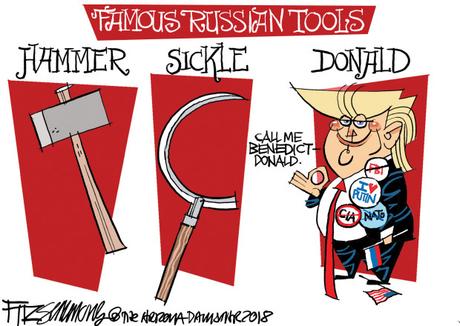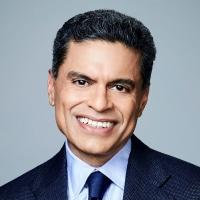 (This cartoon image is by David Fitzsimmons in the Arizona Daily Star.)
(This cartoon image is by David Fitzsimmons in the Arizona Daily Star.) Donald Trump has committed impeachable crimes. That is just a fact. But the media concern over his possible impeachment is driving another story off the front pages. I'm talking about his horrendous foreign policy.
Donald Trump has committed impeachable crimes. That is just a fact. But the media concern over his possible impeachment is driving another story off the front pages. I'm talking about his horrendous foreign policy.Trump has embraced many of the world's worst dictators, while snubbing our best allies. His foreign policy seems to be fulfilling the fondest wishes of Russia's Vladimir Putin. It's making the world a much more dangerous place for the United States and other democracies.
Here's how Fareed Zakaria (pictured) describes Trump's atrocious and dangerous foreign policy in The Washington Post:
While impeachment has been dominating the headlines, we are missing a set of stories about U.S. foreign policy that might prove equally consequential. The Trump administration has been doubling down on a policy of unilateralism and isolationism — a combination that is furthering the abdication of American leadership and the creation of a much more unstable world.
This week, talks between Washington and Seoul broke down after the Trump administration demanded a 400 percent increase in what South Korea pays for the stationing of U.S. troops in that country. The annual operating cost of the U.S. military presence there is approximately $2 billion. Seoul pays a little less than half that. Trump is asking for $4.7 billion
Meanwhile, as the American president ruptures the relationship with one of our closest allies, Trump’s bizarre infatuation with North Korea’s Kim Jong Un continues. Trump has once again called off joint military exercises between the United States and South Korea, even as North Korea has launched 24 missiles this year, all in violation of U.N. resolutions. Last Sunday, Trump asked for another date with the North Korean dictator, tweeting, “See you soon!” The response from North Korea: yet another dis. A North Korean official said that the country is not interested in having “useless” meetings with Washington.
The frictions with South Korea will likely be replicated with America’s staunchest ally in the Pacific, Japan. Trump has also reportedly asked Japan for a significant hike in its payments to the United States. These demands are not simply damaging to the ties between key allies, they are also based on bad economics. If American troops were withdrawn from South Korea and Japan, they would have to be housed in the United States — where there would be no burden sharing and no contributions from Seoul and Tokyo. Unless Trump were planning to demobilize these troops and shrink the military — he is actually trying to expand it — forward deployment in the Asia-Pacific region makes both strategic and economic sense.
Trump’s impulse everywhere is to quit the field. He has done so in the Middle East, ceding U.S. foreign policy to his favorite strongmen, Saudi Arabia’s Mohammed bin Salman and Turkey’s Recep Tayyip Erdogan. The American withdrawal from northern Syria has handed over a large swath of the country to Turkey and bolstered Russia, Iran and the Bashar al-Assad regime. When Republican senators complained about the abandonment of the Syrian Kurds, who lost 10,000 troops supporting the U.S.-led fight against the Islamic State, Trump’s response was to let Erdogan show them a propaganda video claiming that our allies were actually terrorists.
The Trump administration has also given up on support for broad-based norms and values. It withdrew from the U.N. Human Rights Council, ceding the field to countries such as China and Saudi Arabia. The American Civil Liberties Union has charged that the Trump administration has ended all cooperation with international human rights monitors in the United States. Trump’s tariffs have rocked the free-trade system, perhaps irretrievably. This week, the administration reversed the long-standing U.S. position that Israeli settlements violate international law.
French President Emmanuel Macron was criticized for his recent statement that NATO is experiencing “brain death.” But in a thoughtful interview with the Economist, he pointed out that Trump’s policy on Syria was undertaken with no coordination with fellow NATO members. Europe’s interests in the Middle East are potentially greater than Washington’s — refugees flood into Europe, not the United States — and yet the Trump administration blindsided its allies across the Atlantic.
Macron believes that Europe faces an unprecedented challenge in Trump: “We find ourselves for the first time with an American president who doesn’t share our idea of the European project.” He noted that Trump often distances himself from Europe’s defense even against Islamist terrorism: “When he says, ‘It’s their problem, not mine’ — we must hear what he’s saying. . . . I am no longer prepared to pay for and guarantee a security system for them, and so just ‘wake up.’ ” It is ironic and tragic that Europeans believe they are alone in their fight against Islamist terrorism, given that the only time in history that NATO invoked Article 5 — an attack on one is an attack on all — was in response to the 9/11 attacks on New York and Washington.
It’s often said that Iran, Russia and China are rogue regimes whose actions are destroying the rules-based international system the United States built and maintained over the past 75 years. And those countries have certainly engaged in actions that are illiberal and irresponsible. But the greatest threat to the liberal international order right now is surely the Trump administration, which is systematically weakening the alliances that have maintained peace and stability and rejecting the rules and norms that have helped set some standards in international life.

